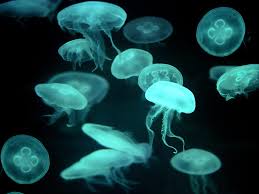Birth
and death are firm words,
the
parentheses we live within.
Even
their meaning is argued
legally,
theologically. Our firmest
ideas
prove to be wobbly.
Love, a convenient word, all-purpose, unisex
is
squishy, overused, wondrously wobbly.
I love you, family, chocolate, seashores
I love you, family, chocolate, seashores
smell
of peonies, bubble baths, Yeats,
the
Trout Quintet, Lucien Freud, travel,
reading,
gingko trees, poetry, bacon
et cetera, et
cetera, ad infinitum…
Pinpoint
it: the helium balloon feeling
of
the first romantic, tender kiss,
that
salivation at baking bread aroma,
that
deep serenity meditating,
that
quickening of the pulse
whirling
around a dance floor,
that
sentimental sadness at La Traviata,
et cetera, et
cetera, ad infinitum…
Like
a jellyfish, love, has no bones
like
whiskey, many become addicted
like
a foggy night, it discombobulates
et cetera, et
ceterta, ad infinitum…
Love
is not a trustworthy word.
If
we refuse to use it
we
will have to search
for
what we really mean.

William Butler Yeats was an Irish poet, one of the chief literary figures of the 20th century, one of the few who (arguably) did their best work after receiving the Nobel Prize.
ReplyDeleteI have seen mannequins,
As white and gold as lilies,
Swaying their tall bodies across the burnished floor
Of Reville or Paquin;
Writhing in colour and line,
Curved tropical flowers
As bright as thunderbolts.
Or hooded in dark furs
The sun's pale splash
In English autumn woods.
And I have watched these soft explosions of life
As astronomers watch the combustion of stars.
The violence of supernatural power
Upon their faces,
White orbits
Of incalculable forces.
And I have had no desire for their bodies
But have felt the whiteness of a lilly
Upon my palate;
And the solidity of their slender curves
Like a beautiful mathematical proposition
In my brain.
But in the expression of their faces
Terror.
Cruelty in the eyes, nostrils, and lips --
Pain
thou passion-flower, thou wreath, thou orbit,
thou spiritual rotation,
thou smile upon a pedestal
Peony of the garden of Paradise!
But here he is in a simpler mode, "The Pity of Love":
A pity beyond all telling
Is hid in the heart of love:
The folk who are buying and selling;
The clouds on their journey above;
The cold wet winds ever blowing;
And the shadowy hazel grove
Where mouse-grey waters are flowing
Threaten the head that I love.
"The Trout Quintet" (Piano Quintet in A major) was written by Franz Schubert when he was 22 but not published until a year after his death. Its fourth movement is a set of variations on his earlier lied "Die Forelle" -- The Trout. Most piano quintets are composed for a piano, two violins, viola, and cello, but Schubert wrote this one for piano, violin, viola, cello, and double bass, in order to accommodate a group of musicians who came together to play some work by Johann Nepomuk Hummel, who had rearranged his own septet for those instruments. In 1969 (140 years after its publication) Christopher Nupen filmed Itzhak Perlman, Pinchas Zukerman, Jacqueline du Pré, Daniel Barenboim, and Zubin Mehta perform it at Queen Elizabeth Hall in London.
ReplyDeleteLucien Freud was perhaps the pre-eminent British painter of the late 20th century. His grandfather Sigmund Freud, the son of a wool merchant, was the founder of psychoanalysis. Sigmund's sister married the brother of Sigmund's wife -- their son Edward Bernays was a pioneer in American public relations, whose wife Doris E. Fleischman was a prominent feminist; their daughter Anne Bernays and her husband Justin Kaplan were American writers. Sigmund's sister Maria married her cousin Moritz Freud; their daughter Martha ("Tom") illustrated children's books and married a journalist; teir daughter became an actress. Sigmund's sister Pauline's daughter married the poet Ernst Waldinger. Sigmund's daughter Anna followed her father's footsteps and established the field of psychoanalytic child psychology. Sigmund's son Ernst became a prominent architect and was the father of the painter Lucian, whose children include sculptor Jane McAdam Freud, painter Paul Freud, fashion designer Bella Freud, novelists Esther Freud (wife of actor David Morrissey) and Susie Boyt; Lucian's brother Sir Clement Freud was one of London's first celebrity chefs and later a Liberal member of Parliament; Clement's daughter Emma Freud became a noted brodacaster, particularly as the host of "Pillow Talk," in which she and her interview subjects were in bed together. Sigmund's grandson Anton became a British chemical engineer; his son David (Baron Freud) was a journalist, businessman, and politician (Labour and then Conservative) particularly identified with welfare reform. Freud's great-grandson George Loewenstein was the founder of behavioral economics.
ReplyDelete"La traviata" (The Fallen woman) is an opera by Giuseppe Verdi and Francesco Maria Piave based on Alexandre Dumas' play adapted from his novel "La dame aux Camélias," which in turn was inspired by Dumas' one-time lover, the courtesan Marie Duplessis (whose other lovers included Verdi's musical rival Franz Liszt). The premier, at the La Fenice opera house in Venice on 6 March 1853, was a disaster, mainly due to the poor performances by Felice Varesi, Lodovico Graziani, and especially Fanny Salvini-Donatelli, the young heroine dying of tuberculosis (Fanny was 38 and fat) -- although the subject matter, which was considered immoral, may have also played a role in its poor acceptance (the title refers to the heroine's practice of wearing a white camellia when her services were available and a red one when they were not due to her biological condition). Verdi revised the work before its second debut at the Teatro San Benedetto in May 1854, and the opera is today the most-performed one in the world (according to Operabase). As "Camille," the play has also been a regular part of the stage and film repertoire.
ReplyDelete